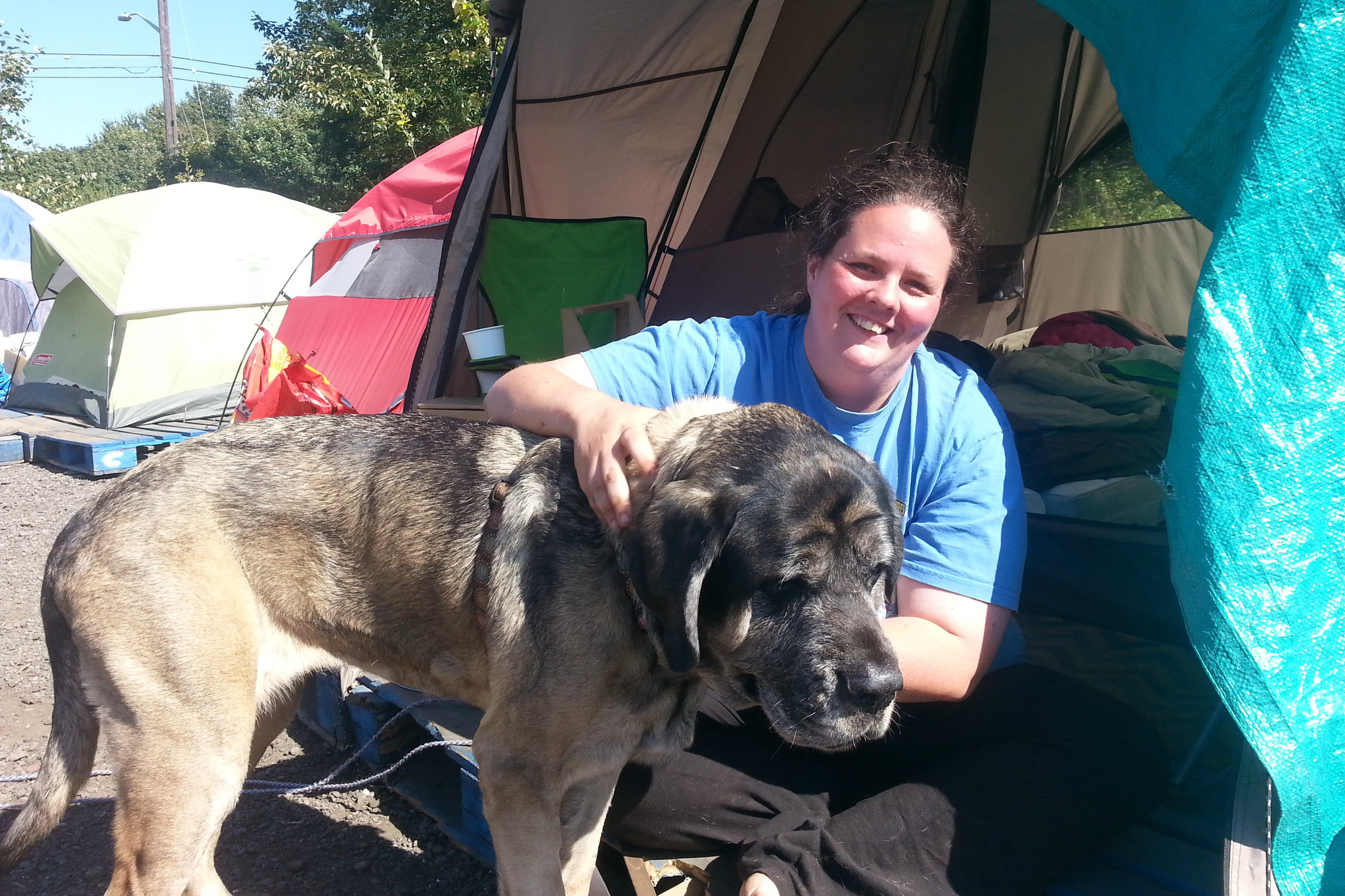The City of Seattle has provided notice to residents at Camp Second Chance, a sober homeless encampment that recently moved onto vacant city land in south Seattle, that they must vacate or face eviction starting Tuesday morning.
According to community organizer and camp advisor Polly Trout, on July 18 the encampment left its erstwhile host Riverton Park Methodist Church in Tukwila when its informal lease of three months ended. Trout says the church will again be ready to host the camp starting next January, but in the meantime the residents have nowhere to stay. The camp “wanted to honor their three month agreement with the church, so they have moved to a Seattle city owned lot that has been unused and vacant for several years,” Trout said in a press release Friday. The spot they initially moved onto, she says, partly overlapped onto private property by accident; when organizers were made aware of this fact, they moved again. The camp is now located on Myers Way South near the southern border of the city. Trout says the camp is searching for somewhere it can land more permanently—that is, at least for a couple months.
“The camp is home to 25 adults, one toddler, and two dogs,” she says in the press release. (There is also at least one cat.) “Most of the camp residents are working.”
Trout says the camp is sober and “well-managed,” as well as “self-governing. … They have a code of conduct, 24 hour security, Honey Buckets, and trash removal. The community is clean, safe, and ethical.” She says the camp is comprised of people who seceded from SHARE’s Tent City 3 in April “in order to create an independent camp more aligned with their needs and values.”
But a spokesperson for the Human Services Department, which is part of Mayor Ed Murray’s executive branch, says that campers cut their way in through a locked gate and set up camp on “city property that includes federally recognized wetlands,” though she acknowledges that the camp and the wetlands are “contiguous”—that is, separate and adjacent. The camp itself is situated atop a gravel parking area, separated from the surrounding flora by makeshift walls of fabric and wood. I counted 20 tents when I visited Sunday afternoon, including a kitchen tent, a group lounge, and a front desk.
“Earlier this month, Mayor Murray announced that ownership of this property will transfer to the Seattle Parks and Recreation Department so its unique environmental habitat can be properly protected and preserved for public use,” says HSD spokesperson Katherine Jolly. “Establishing a large unauthorized encampment contiguous with sensitive wetlands is incompatible with the city’s environmental stewardship of this property.”
Jolly says that city-contracted outreach workers from Evergreen Treatment Services’ REACH will offer services, shelter and case management, as well as storage for belongings during the transition. She emphasized that the city is following its standard procedure for providing notice and “meaningful offers of outreach and services” to evictees.
Trout confirms that she cut through the chain to accesses the fenced-in area; she says she still has the lock and will return it to the city after the camp moves out. “We are on an area that [is] graveled and not disturbing the wetlands, and [we are] removing all trash,” Trout says. “The camp also has Honey Buckets and is trucking in potable water.” As of Friday, she denied that HSD had offered any outreach to the camp.
Alisa Christopher, 35, lives in one of the mid-sized tents with her partner Honey, a graying English mastiff named Grissel, and one or more cats. She says that she and Honey became homeless after their employer, a game developer, went under. They couchsurfed with friends for a year and a half, she says, but both are diagnosed with PTSD, and the effects of that mental illness in addition to the pets ultimately pushed them out of friends’ houses and onto the street. Their plan now is to pursue schooling (which, financially, has been its own Kafkaesque nightmare) and freelance work until they can build up enough of a revenue stream to move back into housing. Christopher says they choose a tent in Camp Second Chance over emergency shelters because of their pets, the fact that Honey is a trans woman (toward whom gender segregated shelters aren’t always kind), and for the stability it brings. “We’ve been getting lots of help from our [in-camp] neighbors, as far as support and getting used to the idea of being homeless,” says Christopher. “My partner actually has been homeless before, but it was when she was a kid. So it’s new for us.”
Given that emergency shelter beds won’t meet your needs for shelter, Christopher, what would? A tiny house, she says, like the ones clustered by 22nd Avenue and Union Street. “To have a more sturdy roof over our heads as an interim thing until we can get into an apartment—I would probably take that,” she says. “But it would have to be a couple of months—at least until October.”
If this camp gets cleared as threatened, where will you go? “Not entirely certain,” she says, but possibly Tent City 3, the very encampment from which Camp Second Chance originally seceded. “If this camp went away, it would at least be an option. It wouldn’t be the best option, but it would still be something.”
An aid in city councilmember Kshama Sawant’s office wrote to the heads of the city’s Office of Civil Rights and Finance and Administrative Services on Friday, asking them to “please do what you can to make sure the residents of Camp Second Chance are not evicted with nowhere to go. … Could they be allowed to remain in their current location until [January]? If that is somehow impossible, please make available another city owned parcel for them to move into.” SHARE has also asked the city not to sweep the camp. “Any group of homeless people who is not harming or disturbing others, and bands together to keep themselves and their loved ones alive, should be congratulated,” they wrote on their Facebook.
We contacted all members of the city council’s Public Health Human Services committee, chaired by Sally Bagshaw, as well as the chair of the county council’s Health, Housing and Human Services committee, Jean Kohl-Welles, asking whether they approved of the eviction plan and whether they plan to take any action on it. We’ll update this post when we hear back.
The 25 or so people living at Camp Second Chance will meet tonight to decide what to do.
cjaywork@seattleweekly.com








